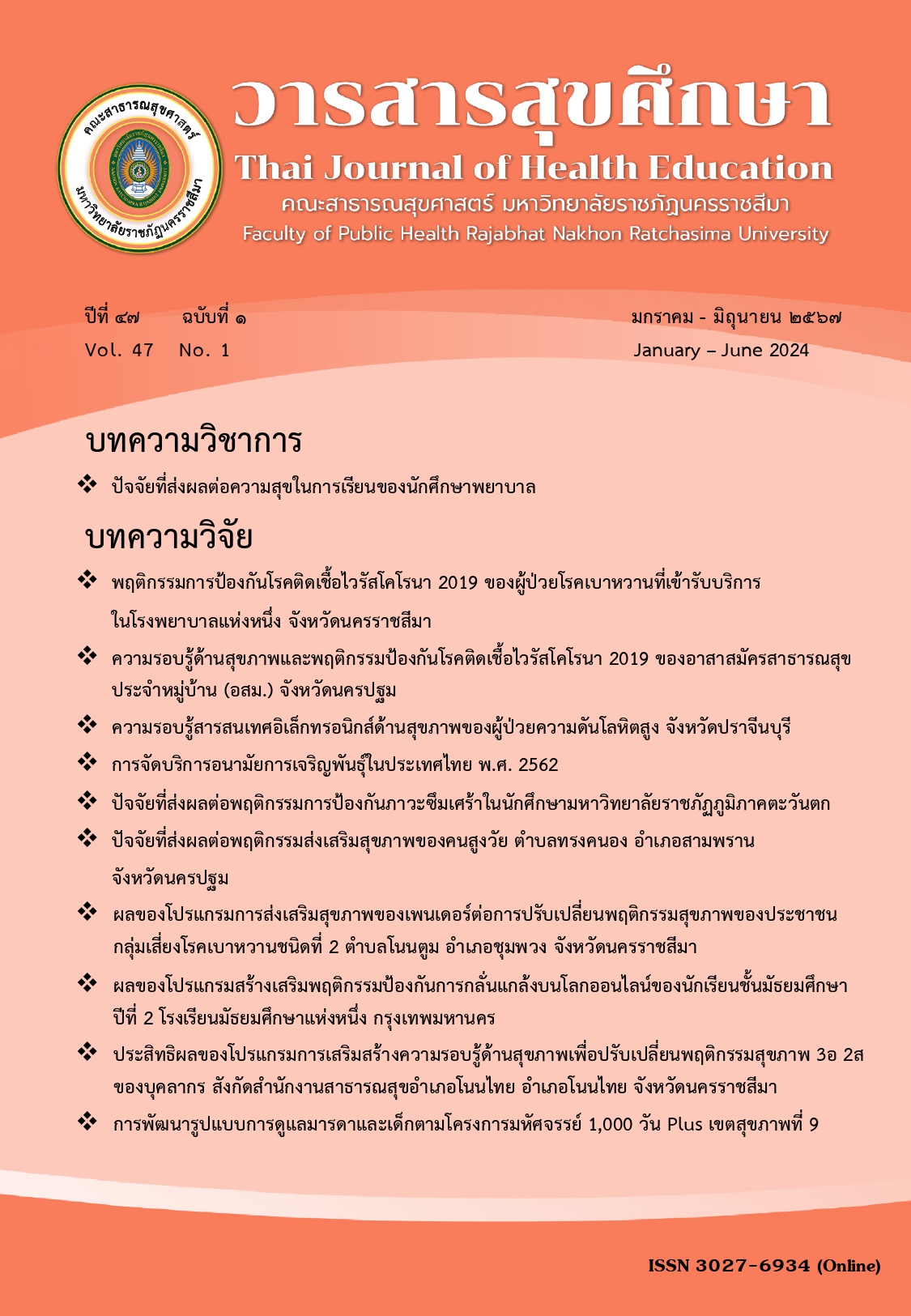Development of maternal and child care model according to the Miracle 1,000 Days Plus project, Health Area 9
Keywords:
Maternal and child care model, Miraculous 1,000 Days Plus Project, Participation, PartnershipAbstract
Thailand is facing a problem of low birth rates and poor-quality children. The intelligence level is lower than the international standard. The process of implementing and solving the problem has not been successful or sustainable. Therefore, it is necessary for the network partners responsible for maternal and child care to develop a standardized model of care. Analyzing situations and finding ways were exchanged between them to come to a conclusion. The purpose of this study was to study the model of maternal and child care through the Miracle 1,000 Days Plus Project in Health District 9 and the cooperation and participation of the involved network partners. This study was participatory action research. A specific target group was selected, including 40 network partners involved in caring for mothers and children in Health District 9. Qualitative data were collected from documents, In-depth interview, and focus group discussion and quantitative data were collected from A questionnaire of the participation. Quantitative data were analyzed using descriptive statistics, and qualitative data were analyzed using content analysis.
The results showed that the development of a model for caring for mothers and children involves organizing the learning process in four areas: decision-making, operations, and receiving benefits and evaluation problems and obstacles include the lack of coordination between experts and the analysis of the causes and results of operations. The solution was to review roles and develop potential at all levels. especially at the district level, including staff in their work in terms of skills, understanding, and care for mothers and children. The success factor was that executives at all levels have continuous supervision and monitoring of operations, and network partners participate in the work. and the overall participation of network partners was at a high level. (=4.03, S.D.= 2.01)Therefore, the development of mother-child care models should have support from relevant agencies and using the model to plan and create guidelines for the further development of maternal and child care models in maternal and child health.
References
สำนักงานคณะกรรมการพัฒนาการเศรษฐกิจและสังคมแห่งชาติ. สรุปสาระสำคัญแผนพัฒนาเศรษฐกิจและสังคมแห่งชาติ ฉบับที่ 13. กรุงเทพฯ: สำนักงานคณะกรรมการพัฒนาการเศรษฐกิจและสังคมแห่งชาติ; 2566.
ศูนย์อนามัยที่ 9 นครราชสีมา. การขับเคลื่อนโครงการมหัศจรรย์ 1,000 วันแรกแห่งชีวิตของเขตสุขภาพที่ 9. นครราชสีมา: ศูนย์อนามัยที่ 9 นครราชสีมา; 2561.
Kemmis, S., & Wilkinson, M: Action research in practice: Partnerships for social justice in education. London: Routledge; 1998.
จารุวรรณ เย็นเสมอ.การขับเคลื่อนโครงการมหัศจรรย์ 1,000 วันแรกแห่งชีวิตโดยใช้การมีส่วนร่วมของภาคีเครือข่าย : กรณีจังหวัดสุรินทร์. สำนักงานสาธารณสุขจังหวัดสุรินทร์; 2564. 5. ฐาปนิต อมรชินธนา. การศึกษาการพัฒนารูปแบบการขับเคลื่อนนโยบายโครงการมหัศจรรย์ 1,000 วันแรกแห่งชีวิตจังหวัด สุรินทร์. วารสารศูนย์อนามัยที่ 9. 2565; 16(1): 186-202.
Best, John W. Research in Education. 3rd ed. Englewood cliffs, New Jersey: Prentice. Hall Inc; 1981.
กองตรวจราชการ สำนักงานปลัดกระทรวงสาธารณสุข. สถานการณ์การตายมารดาในเขตสุขภาพที่ 9. [อินเทอร์เน็ต]. 2566 [เข้าถึงเมื่อ 4 กรกฎาคม 2566]. เข้าถึงได้จาก https://inspection.moph.go.th/index.php.
ภัทรพล จึงสมเจตไพศาล. การศึกษาการพัฒนารูปแบบการดำเนินงานโครงการมหัศจรรย์ 1,000 วันแรกแห่งชีวิตภายใต้กลไกคณะกรรมการพัฒนาคุณภาพชีวิตระดับอำเภอ จังหวัดนครราชสีมา. นครราชสีมา: สำนักงานสาธารณสุขจังหวัดนครราชสีมา; 2564.
ณัฎฐพันธ์ เขจรนันทน์. การจัดการเชิงกลยุทธ์ ฉบับปรับปรุงใหม่ Strategic Management. กรุงเทพฯ: วี.พริ้นท์; 2556.
ธัญยธรณ์ รุจิรัตน์ธีรกุล. การพัฒนารูปแบบและกระบวนการดำเนินงานอนามัยแม่และเด็กของอาสาสมัครสาธารณสุขประจำหมู่บ้าน จังหวัดนครสวรรค์.วารสารศูนย์อนามัยที่ 9. 2564; 15(36); 115-128.
ชัชวาล ทัตศิวัช. การวิจัยเชิงปฏิบัติการแบบมีส่วนร่วม (Participatory Action Research: PAR) : มิติใหม่ของรูปแบบวิธีวิจัยเพื่อการพัฒนาชุมชนระดับท้องถิ่น. วิทยานิพนธ์ปริญญามหาบัณฑิต. คณะศิลปศาสตร์. มหาวิทยาลัยรามคำแหง; 2552.
Downloads
Published
Issue
Section
License
Copyright (c) 2024 Thai Journal of Health Education

This work is licensed under a Creative Commons Attribution-NonCommercial-NoDerivatives 4.0 International License.



